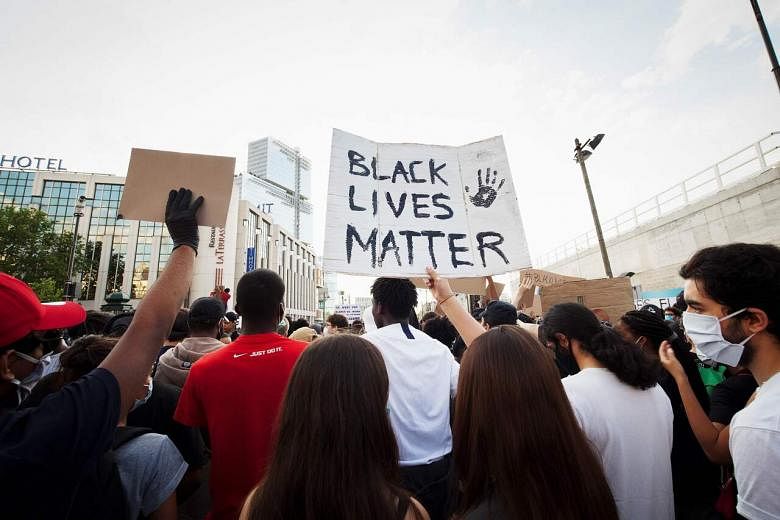WASHINGTON • American diplomats who are the global face of the United States are struggling with how to demand human rights, democracy and rule of law abroad amid concerns overseas and criticism at home over the Trump administration's strong-arm response to the protests across the country.
Diplomats are being confronted by the unrest arising from the death of a black man in police custody in Minneapolis, assaults by security forces on protesters and journalists nationwide, and a tear gas attack that administration officials ordered these past days on peaceful protesters outside the White House.
In private conversations and social media posts, career diplomats at the State Department and the US Agency for International Development have expressed outrage after the killing of Mr George Floyd and President Donald Trump's push to send the military to quell demonstrations.
Diplomats say that the violence has undercut their criticisms of foreign autocrats and called into question the moral authority that the US tries to project as it promotes democracy and demands civil liberties and freedoms across the world.
It has also handed adversarial governments - including those of China, Russia, Iran and North Korea - a powerful propaganda tool to paint a dark portrait of the US.
"As American diplomats, it is our job to explain America to the world," Mr Eric Rubin, a career diplomat and former ambassador to Bulgaria, wrote in a letter last Wednesday to the union of American foreign service officers whom he leads.
"We have always pointed to our story as being worthy of emulation. This week, we have been forcefully reminded that we still have a long way to go as a nation," he said.
Around the world, diplomats at US missions are bearing witness to fresh human rights protests - but ones aimed at the US, not at oppressive leaders of foreign countries.
Hundreds of people have protested at the US Embassy in London and the office of British Prime Minister Boris Johnson to demand racial equality in the US.
Similar demonstrations unfolded outside US embassies in Paris, Berlin and Copenhagen, Denmark.
More than 160 British lawmakers have called for ending exports of riot gear, tear gas and rubber bullets to the US - similar to a ban that Mr Trump and Congress placed last year on products to Hong Kong.
In a statement, the State Department acknowledged challenges that were "difficult to address", but maintained that the US is devoted to free speech and assembly and the rule of law. "The United States is proud of the role we have played in defending and advancing human rights and fundamental freedoms around the world," it said. "Governments that take human rights seriously are transparent, and welcome conversations about addressing concerns and making improvements."
This year, diplomats have already had to grapple with representing a president and government that have been widely criticised for their failures in handling the coronavirus pandemic, which have led to the deaths of more than 100,000 people in the US - far more than any other nation - and a crippled economy.
Current officials, who described frustration and concern in the diplomatic corps, spoke only on the condition of anonymity for fear of retribution or of endangering their careers.
The department is led by Secretary of State Mike Pompeo, who in the past year alone has pushed Mr Trump to fire the agency's inspector-general and refused to back foreign service officers who came under attack from Mr Trump over the issue of Ukraine.
Representative Tom Malinowski, a New Jersey Democrat who served as assistant secretary of state for democracy, human rights and labour in the Obama administration, said "the use of the military to violently disperse peaceful protesters in front of the White House was the biggest gift we could possibly have given to (Russian President Vladimir) Putin or (Chinese President) Xi Jinping and to every other dictator around the world who delights in arguing that America's government is no different than theirs".
After State Department spokesman Morgan Ortagus expressed concern over Hong Kong, writing on Twitter that "freedom-loving people" must "stand with the rule of law and hold to account the Chinese Communist Party", a Foreign Ministry spokesman in Beijing taunted her with Mr Floyd's final words: "I can't breathe."
UCLA law professor Alex Wang, who advocates rule of law in China, said the crises in the US meant American officials had less credibility to single out abusive behaviour elsewhere. "It looks hypocritical when they criticise acts of violence against Hong Kong protesters, even as they call for violence against peaceful protesters at home.
"The right answer is not for the US to stand down as to rights violations abroad, but to uphold rights at home as well."
NYTIMES


